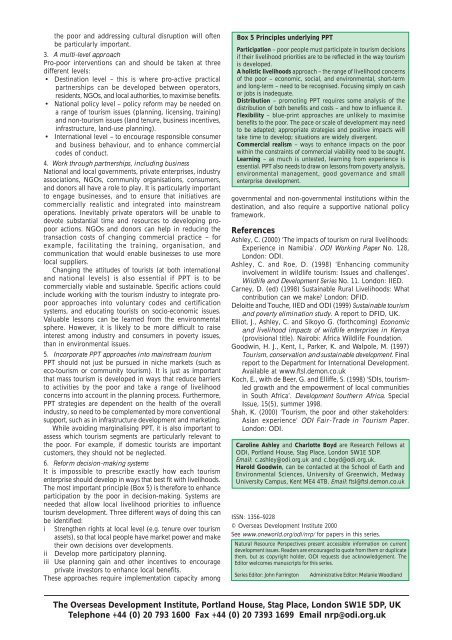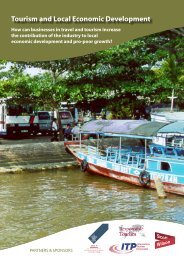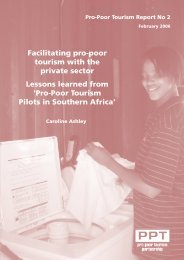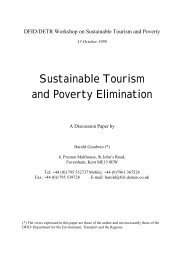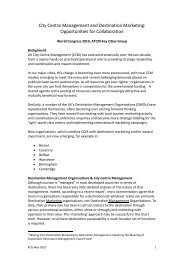Pro-poor Tourism
Pro-poor Tourism
Pro-poor Tourism
Create successful ePaper yourself
Turn your PDF publications into a flip-book with our unique Google optimized e-Paper software.
the <strong>poor</strong> and addressing cultural disruption will oftenbe particularly important.3. A multi-level approach<strong>Pro</strong>-<strong>poor</strong> interventions can and should be taken at threedifferent levels:• Destination level – this is where pro-active practicalpartnerships can be developed between operators,residents, NGOs, and local authorities, to maximise benefits.• National policy level – policy reform may be needed ona range of tourism issues (planning, licensing, training)and non-tourism issues (land tenure, business incentives,infrastructure, land-use planning).• International level – to encourage responsible consumerand business behaviour, and to enhance commercialcodes of conduct.4. Work through partnerships, including businessNational and local governments, private enterprises, industryassociations, NGOs, community organisations, consumers,and donors all have a role to play. It is particularly importantto engage businesses, and to ensure that initiatives arecommercially realistic and integrated into mainstreamoperations. Inevitably private operators will be unable todevote substantial time and resources to developing pro<strong>poor</strong>actions. NGOs and donors can help in reducing thetransaction costs of changing commercial practice – forexample, facilitating the training, organisation, andcommunication that would enable businesses to use morelocal suppliers.Changing the attitudes of tourists (at both internationaland national levels) is also essential if PPT is to becommercially viable and sustainable. Specific actions couldinclude working with the tourism industry to integrate pro<strong>poor</strong>approaches into voluntary codes and certificationsystems, and educating tourists on socio-economic issues.Valuable lessons can be learned from the environmentalsphere. However, it is likely to be more difficult to raiseinterest among industry and consumers in poverty issues,than in environmental issues.5. Incorporate PPT approaches into mainstream tourismPPT should not just be pursued in niche markets (such aseco-tourism or community tourism). It is just as importantthat mass tourism is developed in ways that reduce barriersto activities by the <strong>poor</strong> and take a range of livelihoodconcerns into account in the planning process. Furthermore,PPT strategies are dependent on the health of the overallindustry, so need to be complemented by more conventionalsupport, such as in infrastructure development and marketing.While avoiding marginalising PPT, it is also important toassess which tourism segments are particularly relevant tothe <strong>poor</strong>. For example, if domestic tourists are importantcustomers, they should not be neglected.6. Reform decision-making systemsIt is impossible to prescribe exactly how each tourismenterprise should develop in ways that best fit with livelihoods.The most important principle (Box 5) is therefore to enhanceparticipation by the <strong>poor</strong> in decision-making. Systems areneeded that allow local livelihood priorities to influencetourism development. Three different ways of doing this canbe identified:iStrengthen rights at local level (e.g. tenure over tourismassets), so that local people have market power and maketheir own decisions over developments.ii Develop more participatory planning.iii Use planning gain and other incentives to encourageprivate investors to enhance local benefits.These approaches require implementation capacity amongBox 5 Principles underlying PPTParticipation – <strong>poor</strong> people must participate in tourism decisionsif their livelihood priorities are to be reflected in the way tourismis developed.A holistic livelihoods approach – the range of livelihood concernsof the <strong>poor</strong> – economic, social, and environmental, short-termand long-term – need to be recognised. Focusing simply on cashor jobs is inadequate.Distribution – promoting PPT requires some analysis of thedistribution of both benefits and costs – and how to influence it.Flexibility – blue-print approaches are unlikely to maximisebenefits to the <strong>poor</strong>. The pace or scale of development may needto be adapted; appropriate strategies and positive impacts willtake time to develop; situations are widely divergent.Commercial realism – ways to enhance impacts on the <strong>poor</strong>within the constraints of commercial viability need to be sought.Learning – as much is untested, learning from experience isessential. PPT also needs to draw on lessons from poverty analysis,environmental management, good governance and smallenterprise development.governmental and non-governmental institutions within thedestination, and also require a supportive national policyframework.ReferencesAshley, C. (2000) ‘The impacts of tourism on rural livelihoods:Experience in Namibia’. ODI Working Paper No. 128,London: ODI.Ashley, C. and Roe, D. (1998) ‘Enhancing communityinvolvement in wildlife tourism: Issues and challenges’.Wildlife and Development Series No. 11. London: IIED.Carney, D. (ed) (1998) Sustainable Rural Livelihoods: Whatcontribution can we make? London: DFID.Deloitte and Touche, IIED and ODI (1999) Sustainable tourismand poverty elimination study. A report to DFID, UK.Elliot, J., Ashley, C. and Sikoyo G. (forthcoming) Economicand livelihood impacts of wildlife enterprises in Kenya(provisional title). Nairobi: Africa Wildlife Foundation.Goodwin, H. J., Kent, I., Parker, K. and Walpole, M. (1997)<strong>Tourism</strong>, conservation and sustainable development. Finalreport to the Department for International Development.Available at www.ftsl.demon.co.ukKoch, E., with de Beer, G. and Elliffe, S. (1998) ‘SDIs, tourismledgrowth and the empowerment of local communitiesin South Africa’. Development Southern Africa. SpecialIssue, 15(5), summer 1998.Shah, K. (2000) ‘<strong>Tourism</strong>, the <strong>poor</strong> and other stakeholders:Asian experience’ ODI Fair-Trade in <strong>Tourism</strong> Paper.London: ODI.Caroline Ashley and Charlotte Boyd are Research Fellows atODI, Portland House, Stag Place, London SW1E 5DP.Email: c.ashley@odi.org.uk and c.boyd@odi.org.uk.Harold Goodwin, can be contacted at the School of Earth andEnvironmental Sciences, University of Greenwich, MedwayUniversity Campus, Kent ME4 4TB. Email: ftsl@ftsl.demon.co.ukISSN: 1356–9228© Overseas Development Institute 2000See www.oneworld.org/odi/nrp/ for papers in this series.Natural Resource Perspectives present accessible information on currentdevelopment issues. Readers are encouraged to quote from them or duplicatethem, but as copyright holder, ODI requests due acknowledgement. TheEditor welcomes manuscripts for this series.Series Editor: John FarringtonAdministrative Editor: Melanie WoodlandThe Overseas Development Institute, Portland House, Stag Place, London SW1E 5DP, UKTelephone +44 (0) 20 793 1600 Fax +44 (0) 20 7393 1699 Email nrp@odi.org.uk


